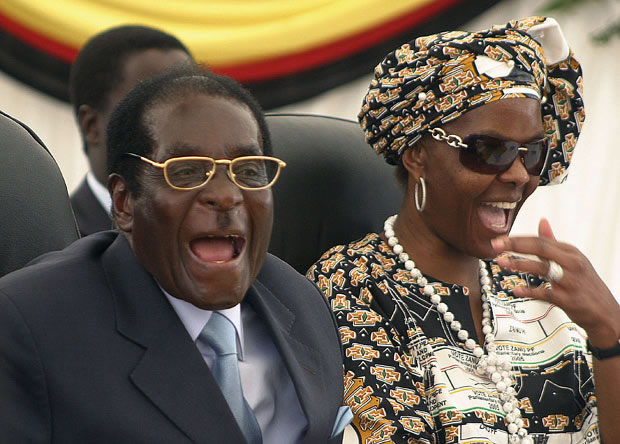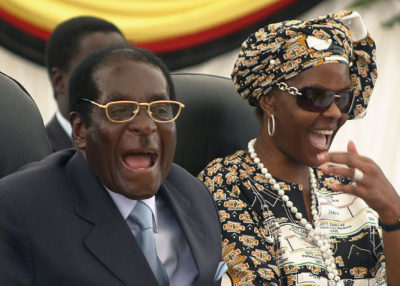Source: Treacherous shenanigans: The story of Mugabe’s downfall – NewsDay Zimbabwe November 27, 2017
INSIDE State House in Harare, Robert Mugabe was in the tightest spot of his 37-year rule. Tanks were on the streets and troops had occupied the State broadcaster, from where the army had announced it had taken control of Zimbabwe.
Reuters
Mugabe, 93 years old but still alert, remained defiant. The only leader the country had known since independence was refusing to quit.
At a tense meeting with his military top brass on November 16, the world’s oldest head of state put his foot down: “Bring me the Constitution and tell me what it says,” he ordered military chief Constantino Chiwenga, according to two sources present.
An aide brought a copy of the Constitution, which lays out that the President is commander-in-chief of the armed forces.
Chiwenga, dressed in camouflage fatigues, hesitated before replying that Zimbabwe was facing a national crisis that demanded military intervention.
Mugabe retorted that the army was the problem, according to the sources present. Then the beleaguered President indicated that perhaps they could find a solution together.
The meeting marked the start of an extraordinary five-day standoff between Mugabe and Zimbabwe’s supreme law on one side, and the military, his party and Zimbabwe’s people on the other.
The generals wanted Mugabe to go, but they also wanted a peaceful “coup,” one that would not irreparably tarnish the administration aiming to take over, according to multiple military and political sources.
The president finally accepted defeat only after he was sacked by his own Zanu PF party and faced the ignominy of impeachment. He signed a short letter of resignation to Parliament speaker Jacob Mudenda that was read out to lawmakers on Nov. 21.
Mugabe, who had run Zimbabwe since 1980 and overseen its descent into economic ruin while his wife shopped for luxury goods, was gone.
The country erupted into ecstasy. Parliamentarians danced and people poured onto the streets in their tens of thousands to celebrate a political downfall that sent shockwaves across Africa and the world.
To many, the end of Mugabe had been unthinkable only one week before.
Reuters has pieced together the events leading up to Mugabe’s removal, showing that the army’s action was the culmination of months of planning that stretched from Harare to Johannesburg to Beijing.
Bitter rivalry
Drawing on a trove of intelligence documents from within Mugabe’s feared Central Intelligence Organization (CIO), Reuters reported in September that the army was backing Emmerson Mnangagwa, then vice president, to succeed Mugabe when the time came.
The report detailed how Mnangagwa, a lifelong friend and former security chief of Mugabe, might cooperate with Mugabe’s political foes in order to revive the economy. It caused furore in Zimbabwe’s media and political circles.
Bitter rivalry intensified between Mnangagwa and Grace, Mugabe’s 52-year-old wife, who also hoped to take over as president and had the backing of a Zanu PF faction known as G40.
In early October, Mnangagwa said he had been airlifted to hospital in South Africa after a poisoning attempt in August. He pointed no fingers — but he didn’t need to.
Grace’s swift response was to deny it and accuse her rival of seeking sympathy; she belittled him as nothing but an employee of her husband, according to a report in the state-run Herald newspaper.
As the pressure built, Mugabe became increasingly paranoid about the loyalty of army chief Chiwenga, a career soldier and decorated veteran of Zimbabwe’s 1970s bush-war against white-minority rule.
Mugabe’s spies, who permeated every institution and section of society in Zimbabwe, were warning him the military would not accept Grace as President.
“Mugabe is very worried of a coup,” one intelligence report, dated October 23, said. “Mugabe was openly told by senior CIOs that the military is not going to easily accept the appointment of Grace. He was warned to be ready for civil war.”
Reuters reviewed the document, and hundreds of other intelligence reports dating back to 2009, before the coup took place.
The documents come from within the CIO, but Reuters could not determine for whom they were written. The CIO is split into factions, some pro- and others anti-Mugabe.
In late October, Mugabe summoned Chiwenga to a showdown, according to another of the documents, dated October 30. It said Mugabe confronted the army chief about his ties to Mnangagwa and told him that going against Grace would cost him his life.
“Chiwenga was warned by Mugabe that it is high time for him to start following. He mentioned to Chiwenga that those fighting his wife are bound to die a painful death,” the intelligence report said.
At the same meeting, Mugabe also ordered Chiwenga to pledge allegiance to Grace. He refused.
“Chiwengwa refused to be intimidated. He stood his ground over his loyalty to Mnangagwa,” the report said.
Reuters put questions about this exchange and other aspects of this article to Mugabe’s spokesman, George Charamba. In an enigmatic text message dated November 23, he replied: “Enjoy Reuters copy. Goodnight.”
Two spokesmen for Chiwenga declined to comment.
After another tense meeting with Mugabe on November 5, Chiwenga left Harare on a pre-arranged official trip and travelled to China, which wields significant influence as a major investor in Zimbabwe.
A day later, Mugabe sacked Mnangagwa as Vice-President and purged him from Zanu PF, the liberation movement that Mnangagwa had served since his youth and for which, as a young militant caught bombing a train, he had nearly been executed.
For the generals, Mugabe had gone too far. The military immediately activated a “Code Red” alert, its highest level of preparedness, a military source said.
Assassination plot
Moments after Mnangagwa was ousted on November 6, the security details assigned to him and his house were withdrawn, according to a statement he issued later. He was told his life was in danger.
“Security personnel, who are friendly to me, warned me that plans were underfoot to eliminate me once arrested and taken to a police station,” Mnangagwa said in a November 21 statement.
“It was in my security interest to leave the country immediately.”
From Harare, he managed to escape over the border into neighbouring Mozambique, where he caught a plane to China, according to one source familiar with his movements. There he met up with Chiwenga, the source said.


COMMENTS